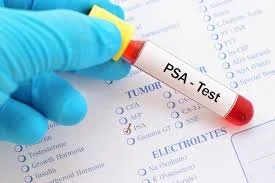Combination of digital rectal examination and serum PSA is the most useful first line test for assessing the risk of prostate cancer being present in an individual. An elevated PSA level has the highest positive predictive value for prostate cancer. The future risk of prostate cancer increases incrementally with the serum PSA level. Contemporary studies evaluating the use of PSA have disclosed that PSA velocity, the change of PSA over time, might be useful for prostate cancer detection among them the PSA levels below 4.0 nanograms per milliliter. Studies have demonstrated that men with prostate cancer have more rapid rises in PSA than men without prostate cancer. Evaluation of at least 3 repeated PSA measurements over time to determine an average rate of change in PSA would appear to optimize the accuracy of PSA velocity for cancer detection. It is generally accepted that a PSA change of more than 0.75 nanograms per milliliter per year may be indicative of prostate cancer particularly when the PSA is less than 4.
Prostate specific antigen (PSA) medical expert witness specialties include oncology, urology, internal medicine, and family medicine.

